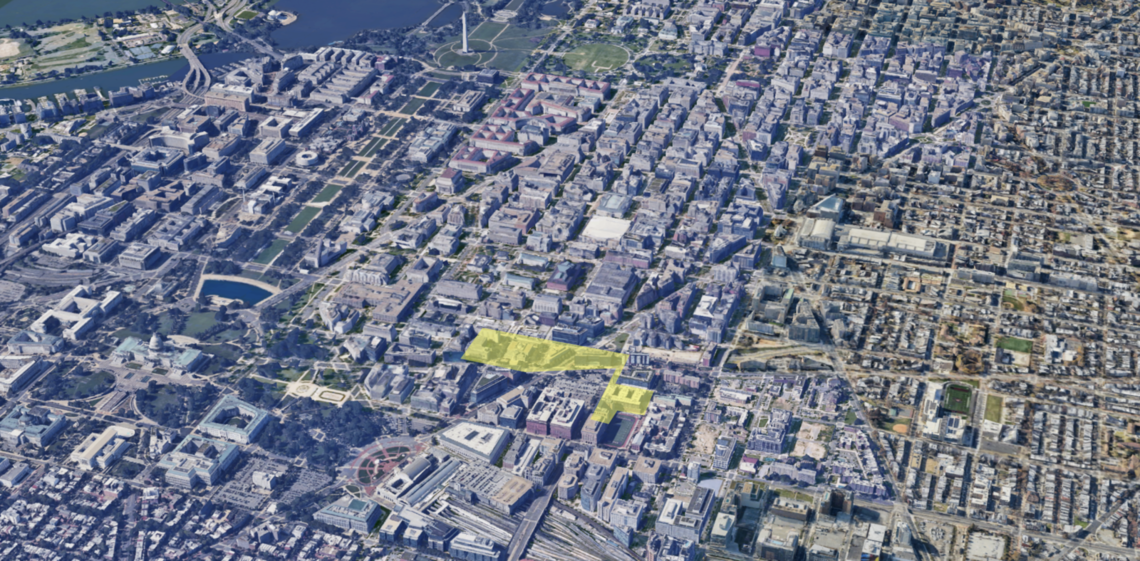
Faculty grants investigating local impact with a global reach.
CAPITOL CAMPUS NEIGHBORHOOD INTRODUCTION
On behalf of the Office of the President, we are pleased to invite faculty scholarship proposals that showcase and foster urban innovation— a project to invite Georgetown faculty to research ideas that advance Georgetown’s role in Washington, D.C., having both local impact and global reach.
As the oldest university in the nation's capital, Georgetown can develop and disseminate knowledge that serves our Washington, D.C. stakeholders. With the development of the Capitol Campus, the University’s relationship with our home city enters a new phase. President DeGioia has stated, “This is a time to unlock our imagination.”
At President DeGioia’s request, a faculty working group has been formed from schools and departments across the university. The working group has developed this call for proposals and seeks to award a first round of $75,000 in faculty research grants in January. The purpose is to explore the broader social impact of the new Capitol Campus's growth on surrounding neighborhoods and other community-based participatory research.
Proposals will advance scholarship in one of three categories: (1) generating and disseminating new knowledge, (2) engaging stakeholders to enrich ongoing research, and (3) developing a plan to attract future funding from external sources.
With this notice, we invite you to apply for the first round of this faculty grant-making process. In this inaugural round, the working group encourages proposals with one of the following foci:
1. Community-Engaged Assessment: Proposals rooted in community-based needs and challenges. These proposals demonstrate active collaboration between researchers and community-based partners to assess and explore available knowledge.
2. Civic Innovation: Proposals that explore innovative approaches to place-based or community-based civic challenges. These proposals explore and describe practical, research-based pilot projects that can be implemented effectively.
3. Interdisciplinary Collaboration: Proposals that combine interdisciplinary expertise to advance a project’s goal. These proposals outline mixed-methods methodologies and access to new data.
4. Pilot Projects: Proposals that develop a concrete plan to engage stakeholder partners through community participatory research. These proposals include a plan to address a specific civic challenge.
The principal investigator must be a member of the Georgetown University faculty, but research teams may include Georgetown students or researchers from other organizations. Non-tenure line and adjunct faculty are welcome to respond. Projects should be completed or show substantial progress by September 1, 2025.
In evaluating the proposals, the committee will ask the following questions:
> What is the potential for this project (or the future research derived from this project) to significantly benefit the Washington DC community, particularly the community surrounding the Capitol Campus?
> Will this project undertake research that falls within urban innovation?
> Is this project of sufficient scale and ambition to be noteworthy?
> Will the project provide a new platform for researchers?
> Will the proposed activities be undertaken without funding from this program?
Application Process & Requirements
The proposal must be submitted via Google Forms and includes the following:
> A project overview, including an abstract, anticipated impact, and all investigators.
> A project proposal statement (no more than 750 words) which addresses the following:
> The central research question;
> The project’s contribution to scholarship;
> The approach to urban innovation;
> A description of how the grant-funded activity will inform target audiences;
> A description of interdisciplinary collaboration if working across disciplines is part of your design.
> A project schedule listing the sequence of activities to be supported by the grant and their completion dates.
> A project budget (no more than $15,000) outlining proposed expenditures, including identification of any other funding sources, if any.
> 1-paragraph biographies of all investigators.
Allowable expenses include travel, materials and supplies, research assistants, data and data collection, etc. Funding may not be used to pay full-time faculty salaries or other direct compensation, and current postdoc and staff salaries will not be supported as part of this program. Requests for undergraduate student wages and other student trainee/RA project support are welcome.
A report (250 words) describing project development will be due by August 1, 2025. Pictures of project activities should accompany the report, and permission should be given to share these with public audiences via the university’s communication channels (social media, magazine, newsletter, etc).
We encourage broad promotion of your project activities as we endeavor to reach a broad audience for your work. If awarded, please acknowledge the financial support of the Georgetown Global Cities Initiative in all public outlets (publications, events, presentations, etc., and social media at @guglobalcities).
Additional materials, including an introductory slide deck, may be found here:
Grant Program Landing Page (this page)
Introduction to the Neighborhood Context of the Georgetown Capitol Campus (slide deck)
The working group looks forward to learning more about your scholarship. Please forward this letter to other Georgetown colleagues who may be interested in this opportunity.
Members of the Faculty Working Group
Carla Shedd, Ph.D., Department of Sociology
Robin Dillon-Merrill, Ph.D., McDonough School of Business
Peter Byrne, J.D., Georgetown Law Center
Maurice Jackson, Ph.D., Department of History
Wouter Van Acker, Ph.D., McCourt School of Public Policy
Intima Alrimawi, Ph.D., School of Nursing
Robert Patterson, Ph.D., Department of Black Studies
Shabab Wahid, Ph.D., School of Health
Matt Biel, M.D., School of Medicine
Uwe S. Brandes, M.Arch, Urban & Regional Planning
Recipients of the First Round of Faculty Research Grants
Young Scholars Program to Promote Community-Based STEM Interest among DC Schoolchildren
(PI: Kenneth Tercyak, Georgetown University Lombardi Comprehensive Cancer Center)
Promoting Early Childhood Development and Adult Employment in Underserved Neighborhoods
(PI: Noel Bravo, School of Medicine)
Mapping Out-of-School Time (OST) Options for Children with Disabilities in the Footprint of Georgetown University’s Capitol Campus
(PI: Pamala Trivedi)
Paving the Way for Urban Innovation and Health Equity: Collecting Oral Histories from DC Community Leaders
(PI: Caroline R. Efird, School of Health, Brian Floyd, School of Health)
Policies Do Not Grow Gardens: Historical Trajectories and Regulation of Urban Agriculture in Washington, DC
(PI: Yuki Kato, Department of Sociology)

